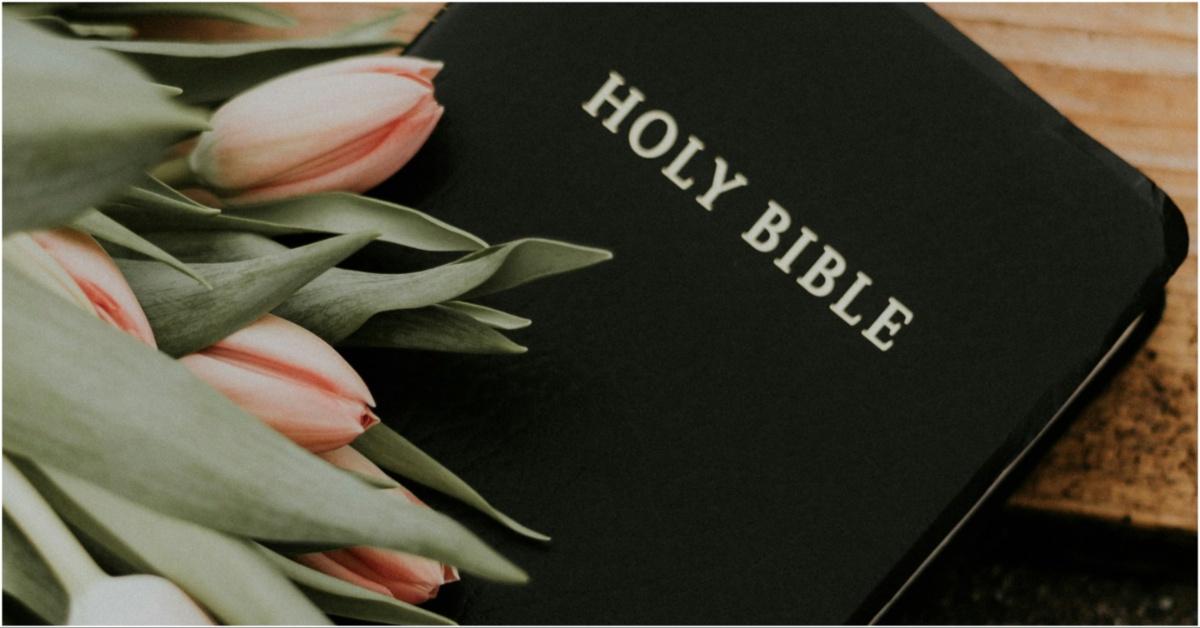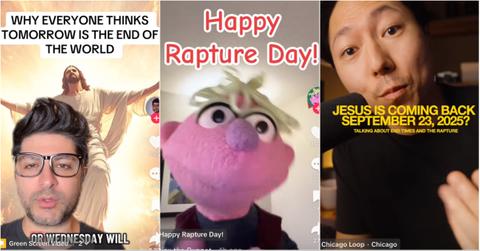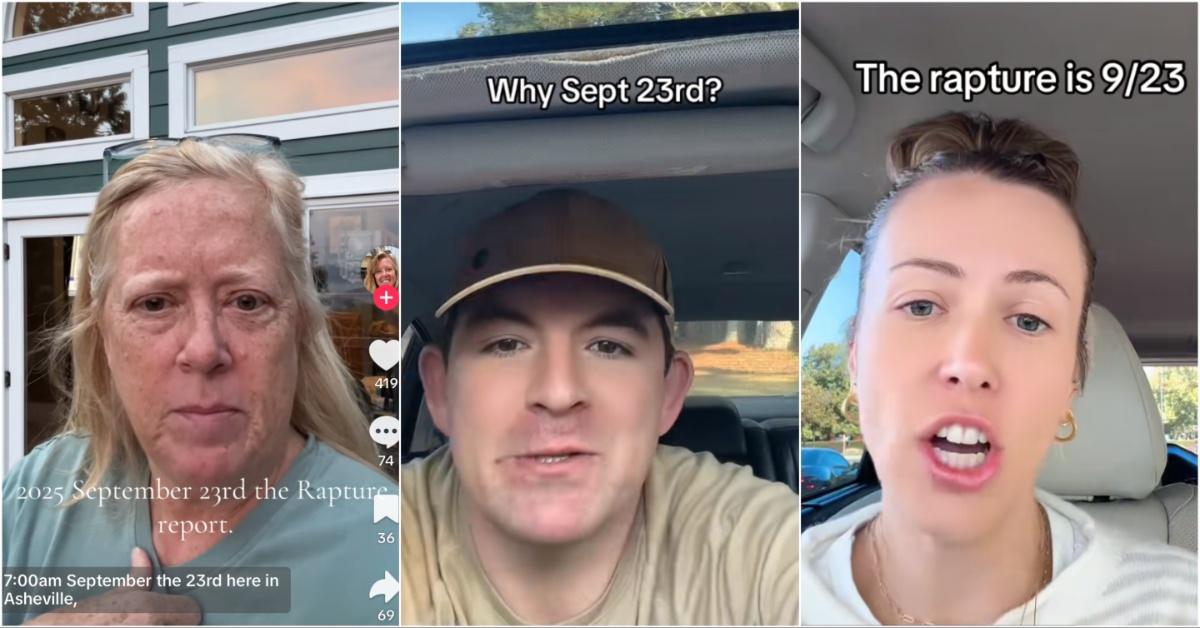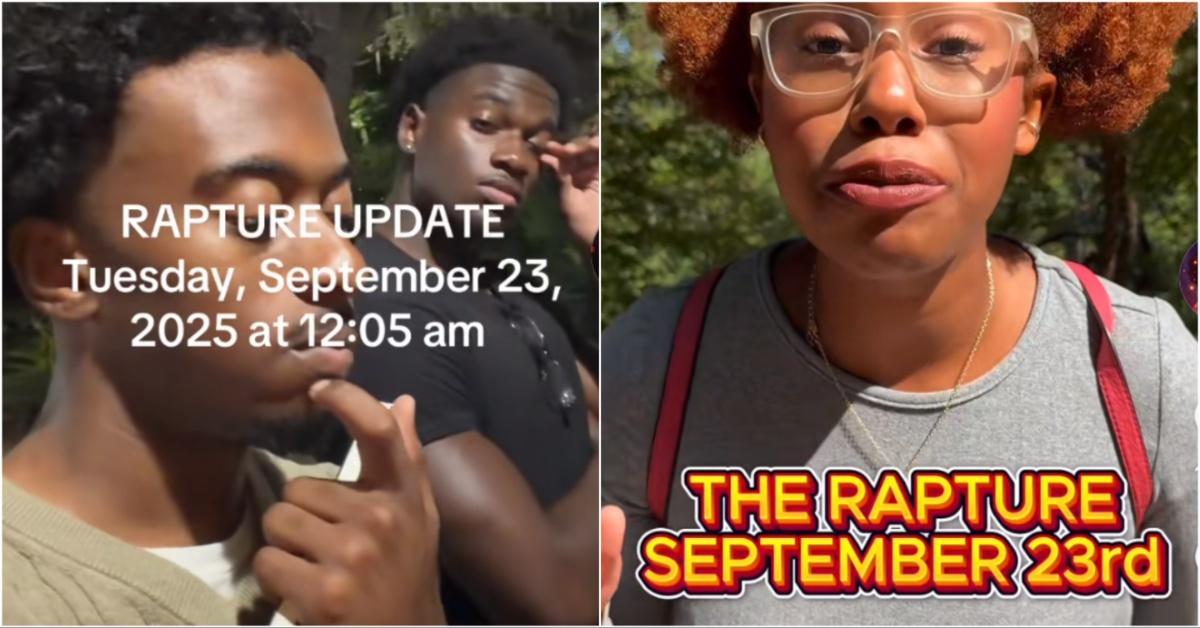Viral Chaos Explains Why People Think the Rapture Is Coming in 2025
Why did people spend the weekend of Sept. 20, 2025 prepping their homes for the rapture?
Published Sept. 23 2025, 11:58 a.m. ET
Over the weekend of Sept. 19-20, 2025, if you were on TikTok long enough, you probably found yourself on a very specific and deeply confusing corner of the internet known as RaptureTok. One minute, you're scrolling through pasta recipes and people decorating for fall — and the next, you're hearing someone sobbing about their final goodbyes to their children before the rapture.
Yep. That rapture.
Some were dead serious. Some were in full-on satire mode. Others were just … vibing through the apocalypse. One thing was clear: something strange was in the air. And the chaos only built from there.
So, why do people think the rapture is coming? And how did TikTok turn that into the weirdest group project the internet’s seen in a while?
Let’s unpack it.
So, why do people believe the rapture is coming? Turns out, the idea didn’t start with TikTok.
First, for anyone new here: the rapture is a belief held by some Christians that one day, all true believers will suddenly vanish from Earth — called up to heaven — leaving everyone else behind.
It's been a running theme in evangelical pop culture (remember Left Behind?) and apocalyptic predictions for decades. Centuries, even.
In the days leading up to Sept. 23, 2025, something strange started happening online. A video of a South African pastor declaring he had a prophetic vision about the rapture went viral, according to chatter on Reddit.
He claimed it would happen that very week. From there, TikTok did what TikTok does best: it ran with it. Some creators stitched the original video with reaction clips, while others made elaborate skits, prayer prep guides, and emotional confessions about their final days with loved ones.
Then, came the satirical side — people joking about being “left behind,” offering rapture survival tips, and even showing their spouses how to do chores for when they’re raptured solo. It got weird. It got hilarious. And those stuck on RaptureTok couldn’t seem to stop scrolling.
There’s a history — and some biblical math — behind why people believed it could be coming.
Let’s be clear: This wasn’t the first “rapture prediction,” and it definitely won’t be the last. There’s an entire genre of failed apocalypse predictions, and the success rate so far? A clean 0 percent.
What made this one stick — for a bit, anyway — was a mix of religious symbolism, pattern-hunting, and a calendar coincidence. That week just so happened to line up with Rosh Hashanah, also known as the Feast of Trumpets, which some people believe has prophetic ties to the end times.
The theory goes like this: In Revelation, there’s a seven-year period of tribulation that begins with the rapture. Some believe the start of that period could align with certain Jewish holidays.
If you count forward 1,260 days (a biblically significant number) from the Feast of Trumpets in 2025, you land on Yom Kippur, another major Jewish holiday. This alignment, while rare, has happened a few times in the last century — and not again for decades. To believers, that timing felt too perfect to ignore.
Then, you add in the dreams. Visions. Gut feelings. For some, that’s all the confirmation they needed.
TikTok turned belief into a bizarre blend of sincerity, mockery, and meme culture.
If you're wondering how the internet reacts when it thinks the literal apocalypse might be scheduled for Tuesday, the answer is: with a healthy dose of chaos.
TikTok became a kind of communal theater for the event — half confessional booth, half sketch comedy show. There were genuine tears, heartfelt prayers, and people saying their neighbors had asked them to watch their pets “just in case.” Others were rapture-proofing their homes for the left-behind.
It was, for lack of a better term, a full-on vibe shift. The comment sections became theology debates and comedy clubs at the same time.
One Reddit user quipped: “As an Australian currently residing in the 23rd, can confirm, rapture did not happen.” Another joked: “Does anyone know what time zone Jesus operates in?”
So … Was any of it real?
That depends on what you mean by “real.” The rapture didn’t happen. But the emotions, beliefs, and anxieties behind it? Those were absolutely real.
Some people were scared. Others were hopeful. A lot were just caught up in the moment. As one Redditor put it, “This is nothing new. These predictions have been made for centuries. But some people really do believe, even when they’ve been wrong a hundred times before.”
Honestly, that’s kind of the point. Belief in the rapture is tied to hope, fear, longing for justice, and sometimes — yeah — a need to feel like something bigger is about to happen. In uncertain times, end-of-the-world thinking tends to spike. When the world feels overwhelming, even the weirdest TikTok rabbit hole can feel like it has meaning.

So, why were so many people so quick to believe the rapture was happening? Because if you look hard enough for something you are going to find it. Because someone on TikTok said so. And, because both belief and fear are very powerful things.
Whether you're a skeptic, a believer, or just here for the memes — RaptureTok was a moment. One of those “you had to be there” things that made you laugh, cringe, and maybe question your existence.
If it turns out the next prediction is right, at least you won’t have to deal with TikTok’s algorithm anymore.


